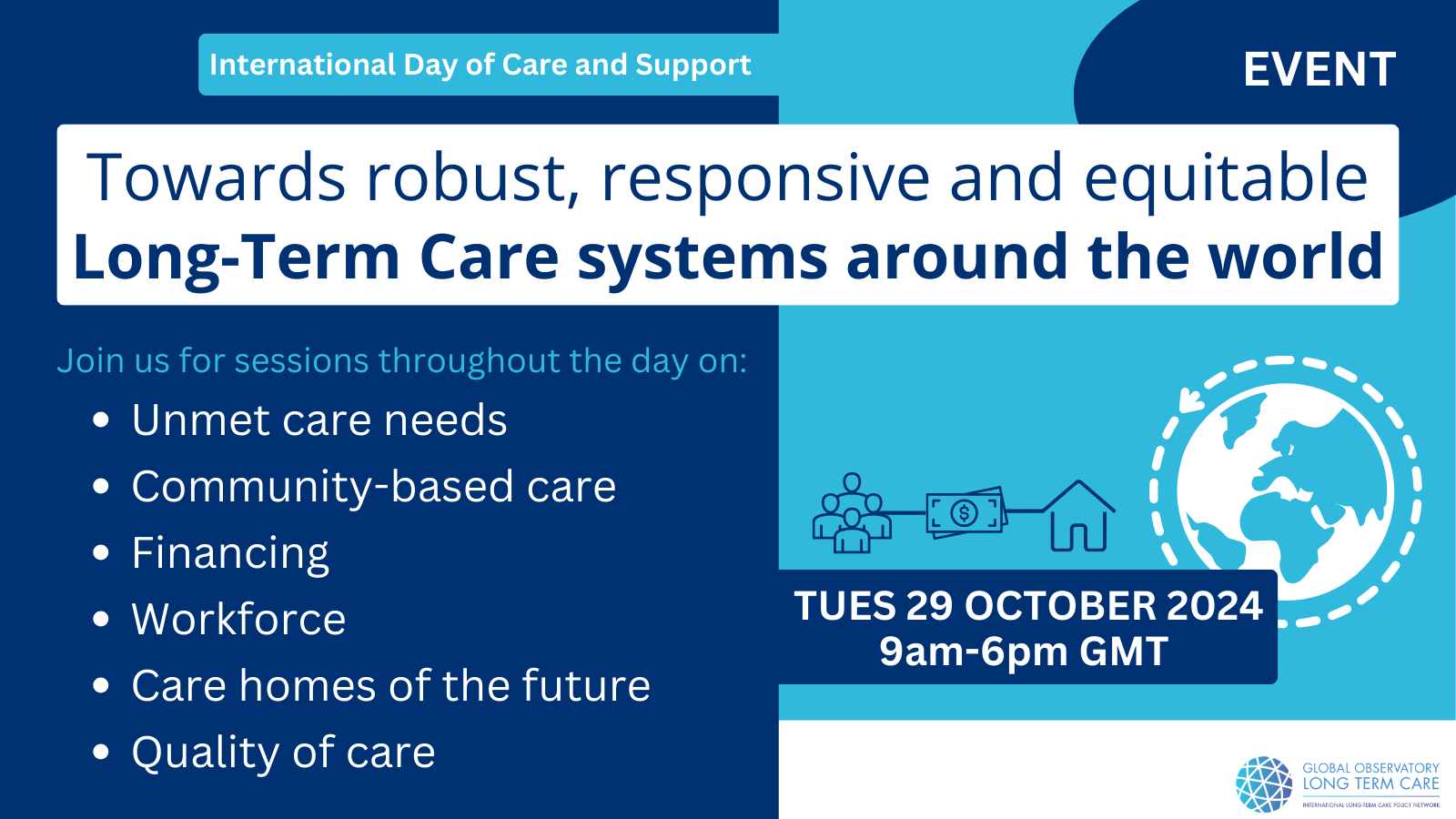International Day of Care of Support GOLTC online event: Towards robust, responsive and equitable Long-Term Care systems around the world
International Day of Care of Support GOLTC online event: Towards robust, responsive and equitable Long-Term Care systems around the world
29 Oct, 2024
EventsNews
Published:
03 Oct 2024

Date: 29 October 2024
Times: 9am to 6pm UK time, you can check your local times here.
To mark the United Nation’s International Day of Care and Support, the Global Observatory of Long-Term Care will host a day long event featuring presentations from experts on Long-Term Care on key topics that need to be addressed to progress towards robust, responsive and equitable Long-Term Care Systems globally, as well as a special session highlighting the World Health Organisation’s work on Long-Term Care. The presentations will be grouped in 6 themes: Unmet Long-Term Care needs; Community-based Long-Term Care; Financing; Workforce; Care homes of the future; Quality of care.
Free registration using this link.
Programme so far:
9.00 Opening
- Adelina Comas-Herrera (GOLTC director and (Care Policy and Evaluation Centre, London School of Economics and Political Science, UK): Introduction to the Global Observatory of Long-Term Care and key priorities to strengthen LTC systems
9.15 Unmet need
- Teppo Kröger (Department of Social Sciences and Philosophy, University of Jyväskylä, Finland): Unmet needs and care poverty
- Julie Byles (University of Newcastle, Australia): What do older people need or want in terms of support and care in later life?
- Viktoria Szenkurok (Vienna University of Economics and Business, Austria): Informal and formal long-term care utilization and unmet needs in Europe: examining socioeconomic disparities and the role of social policies for older adults
- Discussion
10.30 Community-based care
- Henk Nies (Vrije Universiteit Amsterdam, the Netherlands): Innovative approaches to community-based care in the Netherlands
- Míriam Montané Goetzenberger (Municipal Institute of Social Services of Barcelona, Spain): New municipal management model of Home Care Service: Proximity teams for home social care in Barcelona
- Lourdes Zurbanbeaskoetxea Laraudogoitia (Diputation of Bizkaia, Spain): EtxeTIC, a new paradigm of community and technological support for staying at home
- Karla Cristina Giacomin (Municipal Health Department, Belo Horizonte, Minas Gerais, Brazil): The challenges of Integrated Community Care in Brazil
- Qiushi Feng (National University of Singapore): Singapore’s strategy of prevention and integrated care in the community and the role of NGOs
- Discussion
11.45 Break
12.00 Financing, with a focus on Low and Middle Income Countries
- Sarah Barber (WHO Centre for Health development (WKC), Kobe, Japan): Long-Term Care financing and lessons for Low-and Middle-Income countries
- Tirta Sutedjo (Director of Poverty Alleviation and Community Empowerment, Ministry of National Development Planning, Bappenas, Indonesia): The development of Long-Term Care systems in Indonesia
- Myo Nyein Aung (Juntendo University, Japan): Effectiveness of a community-integrated intermediary care (CIIC) service model for Thai older adults
- Elena Moore (University of Cape Town, South Africa): Long-Term Care financing in Southern Africa
- Discussion
13.15 World Health Organization’s work on Long-Term Care
- Hyobum Jang (World Health Organisation): Long-Term Care in the Global Policy Agenda
- Stefania Ilinca (WHO Regional Office for Europe): Priorities and initiatives in the EURO WHO region
- Patricia Morsch (Pan American Health Organization, WHO Regional Office for the Americas): Priorities and initiatives in PAHO
- Amrita Kansal (Southeast Asia Regional Office of WHO: Developments on LTC policy in the SEARO region
- Sarah Barber (WHO Centre for Health development (WKC), Kobe, Japan): Supporting long-tern caregivers in Low and Middle-Income countries
- Stefania Ilinca (WHO Regional Office for Europe): Empowering informal carers: Core information for informal caregivers to support care and self-care tasks
- Discussion
14.15 Long-Term Care Workforce
- Paola Sillitti (OECD): Working conditions in the LTC sector across OECD countries
- Shereen Hussein (London School of Hygiene and Tropical Medicine, UK): An overview of LTC workforce policy in the UK
- Elaine Ho (National University of Singapore): Multi-directional care, training and aspirations: older Singaporeans and their migrant domestic workers
- Brian McGarry (University of Rochester, United States of America): Workforce Challenges for US Nursing Homes and their Implications for Access and Quality
- Discussion
15.30 Break
15.45 Care homes of the future
- Mara Brouwers (Living Lab in Ageing and Long-Term Care and Maastricht University, the Netherlands): Innovative living arrangements for older persons
- Reena Devi (NICHE Leeds, University of Leeds, UK): Science and Care Partnerships – a Pathway to Co-produced and Impactful Care Home Research
- Elisa Pozo Menéndez (Matia Instituto, Spain): Learning to design spaces for living and wellbeing in care homes. Results from 17 study cases from Asturias and Gipuzkoa in Spain
- Frode F. Jacobsen (Centre for Care Research, Western Norway University of Applied Sciences): Built environment of Norwegian care homes in an international perspective: some promising and non-so-promising trends
- Dimitra Xidous (TrinityHaus and Centre for Social Innovation, Trinity College Dublin): Rethinking the Design of Care Homes for Inclusion, Quality of Life, and Resilience
- Discussion
16.45 Quality of care
- Cassandra Simmons (WHO Regional Office for Europe): Promoting quality management in Long-Term Care
- Bellis van den Berg (Vilans, the Netherlands): Improving and supporting quality of care in Dutch nursing homes
- Milan van Keulen (Erasmus School of Health Policy & Management, the Netherlands): Rethinking regulating person-centred service provision, reflexive regulation in dementia care networks
- Juliette Malley (Care Policy and Evaluation Centre, London School of Economics and Political Science, UK): Quality of care vs outcomes
- Jose-Luis Fernandez (Care Policy and Evaluation Centre, London School of Economics and Political Science, UK): Determinants and implications of quality in long-term care
- Discussion
18.00 Goodbye!
We will add further details of the programme and speakers in the next few days, if you would like any more information, please email us at ilp-network@lse.ac.uk
This event will be recorded and videos of each of the sessions will be shared in the GOLTC library of videos.

![]()

